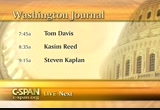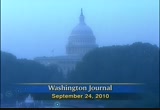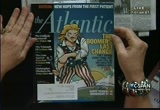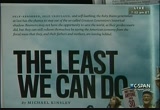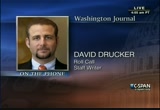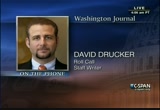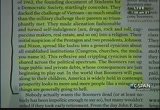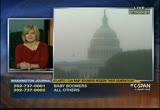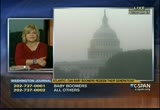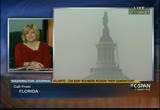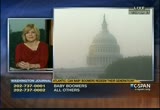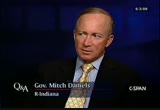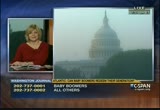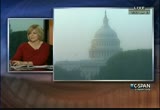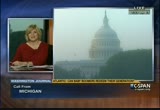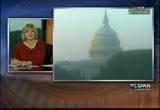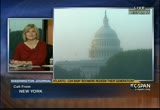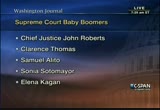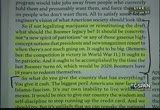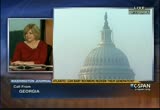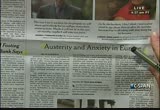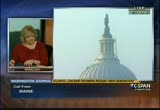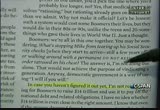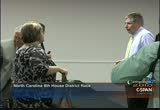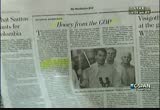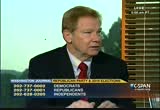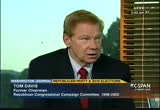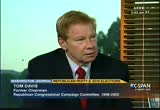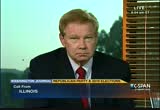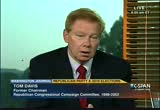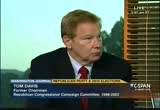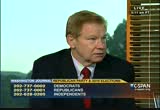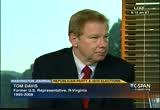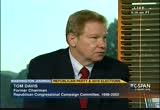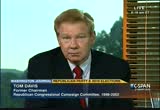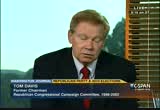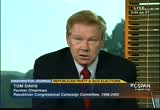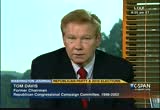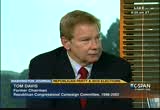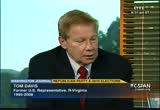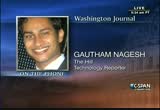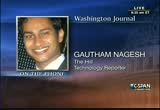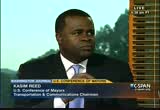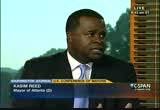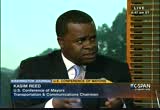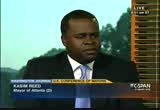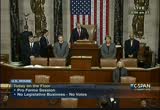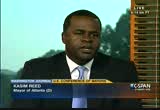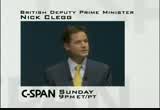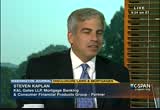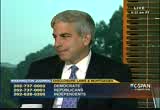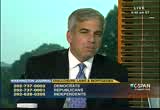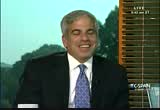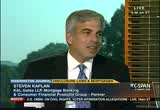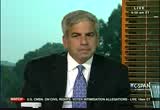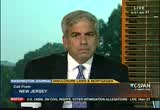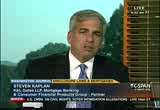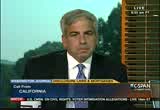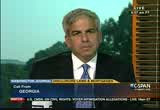tv Washington Journal CSPAN September 24, 2010 7:00am-10:00am EDT
7:00 am
give his perspective on the challenges facing u.s. cities and later, steve capt. talks about banking rules for the industry. from the nation's capital, this is "washington journal." host: good morning. it is friday, september 24, 2010 and you are watching "washington journal" and you can see it is a foggy morning here at the nation's capital. the senate yesterday, they managed to deliver a small business bill to the president. if they decided to delay the tax debate until after the election and on campaign finance, the republicans managed to turn down
7:01 am
a movement that would have addressed the citizens united decision for the supreme court. we will be talking about a lot of issues this morning, including the house gop pledge to america. and there will be a discussion of disclosure laws for mortgages. we will begin with a discussion about the baby boom generation there is an article in the atlantic, can the baby boomers ?edeem their generation .. and our numbers are on the screen. we will get to your calls and questions in just a few minutes. let me show you the cover of the
7:02 am
"atlantic." and we thought we would use this piece as a jumping off point to have a conversation with you of how the baby boomers run the country. many baby boomers are at the scene of their careers and moving on to retirement and the next 10 to 12 years. many are at the height of being able to do things with their careers. many are politicians. we thought we would ask you how the big brewers have done with their turn had run in the country. the piece begins this way -- self absorber, self indulgent, and self loathing, the baby boom generation has of last have the chance to get -- a step out of the greatest generations
7:03 am
shuttle. they may not be able to save the world as the previous generation did, but they can save the american economy from the fiscal mess that they and their fathers and mothers, are leaving behind. we would like to hear what you think about the baby boomers. we have divided the phone lines by baby boomers and all other generations. since we are not doing party affiliation, when you call in this morning, why don't you tell us where you fall politically. it will be interesting to hear how you fifth and the leadership -- your view of the leadership of the baby boom generation david drucker is here from roll-call. and we invited him here to give us his perspective. , it looks like the house may not be in session as long as had
7:04 am
been predicted. guest: it is an election year and members are very focused on november 2. if you're a democrat in particular, you are worried that you are going to lose and everyday use spent in washington you figure could be how many votes against you from your constituents because people are not very happy with and see these days. republicans are happy to stay in washington and watched democrats argue among themselves over tax cuts and things like that. in the election that appears to be shaping of the way this one is where it is mostly democrats that are under threat, republicans are less concerned about going home to campaign because right now, things look better for them that they do the other side. host: let's talk about the major items that the senate was intending to deal with.
7:05 am
first, the tax-cut debate. what are the pros and cons of not having the debate as soon as possible? guest: i think that, neither side can really decide if it helps them to have a vote on extending the bush tax cuts or not. the democrats, of course, want to do a partial extension and the republicans want to do an extension for all income tax brackets. had morerats' agenda availability to bring this up. some of thank you democrats want only some of the extension. and republicans could force the issue in certain instances. there are ways for them to do that. but i'm not sure they want to get into a is a georgia where there is a partial extension that ends up on the floor and
7:06 am
they are forced to read your vote for or against that, and if they vote for it, with the republican -- would the republican base to see that as support for obama? that is kind of how they have decided to deal with this, after the election. because they didn't bring this immediately upon their return from the august recess, they would have to wrap it up quickly. at least in the senate, that is how things go. host: and one other item to discuss with you, that is, the so-called disclosed act. the president has been talking about it in public meetings for the past few months. yesterday, republican stood firm on that and they were not able to get the 60 votes to break the filibuster.
7:07 am
where does that issue stand? guest: nowhere, pretty much. this is not anything that the republicans are working -- that the voters are worried about. there is simply no political motivation for republicans to vote for a bill that most of them do not like, in any case. i do not think it will go anywhere for the foreseeable future, even after the election. host: what is the senate doing? guest: the senate is at home campaigning, for the most part. the senate is not voting again until monday or tuesday. i expect the senate and house to finish with their legislative business by the end of next week. host: mr. drucker, thank you for
7:08 am
7:09 am
that is michael kinsley's view of the boom generation. we would like to hear yours. ,et's go to a call from indiana deborah, an independent candidate in rohrer. -- and a baby boomer. caller: i think chancellor hasn't all wrong. i was born in 1949 -- i think kingsley has it all wrong. i was born in 1949. i spent years of my use actively fighting against the vietnam war.
7:10 am
that yielded a lifetime of activism which continues today. i worked hard to get obama elected and i think that is a great success of the baby boom generation. yes, we are cynical about politicians in general,, interest -- congress specifically. ier.i am not a tea party europ the media can and put a finger on us. i do not think there will be a tidal wave for the gop. i think there will be changed, but the so-called new contract that they put out is a hoax. if voters fall for it, they will be starting. host: deborah from north carolina. the next call is not a baby boom generation. which generation do you belong to?
7:11 am
caller: i am and if the world war ii generation or the baby boomers, i believe -- if the world war two generation are the greatest generation, then i believe the baby boomers will be known as the greediest. by what was mine. what is yours is mine and nobody -- i want what is mine. what is yours is mine and of the ones to contribute to society. it is, in my view, the previous generation. host: nelson from west virginia. if you are from generation x, or generation y, we want to hear from you, since you will be in europe in the world -- you will be inheriting the world from the baby boom generation. and those folks that came out of
7:12 am
the world war ii years, if you would like to talk about the baby boomers and what you left them, that would be an interesting conversation as well. the next call is from wisconsin, ron on the democrats line. ron, what generation are you in? caller: high may boomer -- i'm a boomer, born in 1947 and i think the article is way off balance. i think the contribution of the boomers goes beyond any of the other generations in the fact that people nowadays can actually say no, instead of just marching in lockstep with what happened up until the 1960's. we could say, hey, wait a second, something is wrong, and
7:13 am
to make changes. and these changes really shaped present generations. and i think if anything, the present generation are the ones that are released boyle, undereducated, and really do not have a direction. -- are really spoil, interrogated, and really, do not have a direction. -- under educated and really, do not have a direction. host: thanks for your perspective. florida, democrats line. caller: our generation was really the sproat generation. -- the spoiled generation. we emerged during the post world war ii timeframe.
7:14 am
everything seemed optimistic because world war ii was over and we had such great affluent. but we have come into reality. also, i have to get my democratic philosophy into this. i will be perfectly frank. i think that the right wing has devastated this country. i absolutely believe this wholeheartedly, even though my grandparents and parents were republican. my parents were much more progressive and better educated than my grandparents. i personally think the republicans ruined our country. host: thanks for your phone call. brian sent us this tweet. although we do not know what generation he belongs to.
7:15 am
baby boomers are considered to having been born between 1946 and 1964. the term "baby boomers" was coined by landon jones who wrote a book called "america and the baby boom generation." president of the baby boom generation bill clinton, george of the bush, and barack obama because he was born in 1961. however, barack obama, technically a boomer, but ran against many of its values and got a lot of votes as a result. mark on the democrats line, good morning. caller: i was born in 1951.
7:16 am
i was raised in the d.c. area. the right wing is going to destroy this country. it is sad, but it breaks my heart. i've got my father buried at arlington cemetery and i've never made more than $40,000 per year and i have seen whether rich deployed in this country and their greed is taking over this country. it breaks my heart. i agree with the gentleman before me. host: the bismark from baltimore. -- that is marked from baltimore. maverick tweets -- michael kinsley says, "the same
7:17 am
7:18 am
vivian, a baby boomer herself calle. caller: i am a baby boomer and i think my parents, the greatest generation, they've really great. -- they were really great. in the 2000 election when everyone was having their own pundits, and everything you have someone on the dead did some survey that the said these people -- someone on that said from some survey that these people were coming in and having more trees and things. i think you are a right wing corporate mouthpiece. host: thank you, vivian, for
7:19 am
your kind words this morning. the next call is from demetrius on the independent line. caller: i would like to say this is my warning to america about the new world order, that the country is run by the bohemian group. host: how what does this have to do with the baby boomers? caller: pretty much. regardless to that, they have fema camps set up. host: we are talking about the baby boomers this morning. michael, a democrat and a baby boomer himself, go ahead. caller: by a group -- i disagree that this entire mess is because of the baby boomers. i live in naples, fla., in the belly of the right wing beast and it is the greatest
7:20 am
generation that has consumed everything and is holding on to everything. my generation, we're the ones standing in the classrooms and in the trenches. we are working hard for change. i disagree that we have fouled it all up. host: thanks, michael, for your comments. mitch daniels talked about the baby boom generation in 2009. we invited him on the program to talk a little more about it. let's listen to what he has to say. >> i see a contrast between, frankly, the values that made america a what is, some what butler ideals,he and is in the baby boom generation. i do not believe we have done as well as we could have. for instance, the debt we are
7:21 am
passing on to these young people is going to be very difficult thing to manage. we could have shown more political maturity in the way that we financed the entitlements we have committed ourselves to and that sort of thing. i was urging them to be less self-absorbed, think more about others, in more about the future unless about today. host: mitch daniels, governor of indiana, a republican. he is contemplating a run for the board house bid. next call from richmond, randy, also a baby boomer. caller: i wanted to put my two cents' worth in and say that i thought maybe perverse were spending money wisely rather
7:22 am
than -- that baby boomers were spending money wisely rather than nad. -- not. the government now and the obama administration is not spending our money wisely. that is what we need to do, spend our money more wisely. host: l. reddick writes on twitter -- we are talking with you about the baby boom generation notable business people who are baby boomers include steve jobs of apple, jeff bezos of amazon, steve case of aol, and bill gates, who founded microsoft. the next is a call from michigan, randy, democrats line.
7:23 am
caller: good morning and thank you for taking my call i do not know if he is still alive, but i wish to have professor herman nasty on there. if i was born in -- professor herman massey on there. i was born in a 1965. my views are so much different than these baby boomers. i'm so tired of being stuck with these baby boomers. those people were off in their own little world. they are the greedy ones and on the one out here trying to help everyone. the people that i know that our two years older than me, i guess i go along with president obama and the way they'd title bout group. i am the anti- baby boomer group. we're all americans and we've
7:24 am
got to get this country back together no matter when we were born. host: thank you. sasha tweets -- in congress in the leadership, john larsen was born in 1948 as was chris van hollen in maryland. as for republican leadership, republican john barringer is a baby boomer. eric kanter, the minority whip, at the denver end of the baby boom, born in 1963. chuck schumer is the only baby boomer in the bunch in the senate on leadership. next telephone call is from danville, virginia. good morning to joanne, independent. caller: i am a baby boomer and i
7:25 am
disagree with classifying people within age groups. that is not important at all. people have different personalities. our problems stem from the fact that we have been in a famine and we have no truth in this country. we need to depend on god and we need to of knowledge that his kingdom has come. stop with the allies. our country is in bad trouble because of the lies and secret meetings of congressman. they have done a study [unintelligible] it is time for truth in america. host: also, william grant brings -- god in his tweet next is a call from liverpool,
7:26 am
ohio, john on the independent line. caller: people can see what happened and what is the future and what is the past. everybody has a track record. everybody sees what is going on and what led to possibly the future looming over us. it all falls down to morals and what is right and selfishness. people need to understand that. people are making their comments, but it is all about right and wrong and what is true. we have got to fix this. host: michael kinsley writes in his piece -- rumors have the right to feel -- next is a call from albany, new
7:27 am
york. this is a of him on the baby boom line -- this is him on the baby boom line. caller: i have an objection to the whole statement of the previous caller of not being categorized. it really cannot be blamed on an entire generation. it summed up in a few things. if we do not get the federal reserve of of the control of our monetary system, this is what is what to happen. koran policy of a person who dedicated his time on stage speaking -- ron paul is the only person who dedicated his time on stage speaking to the american people about the situation that our leaders have put us into. the secondary issue falls into
7:28 am
those elected leaders being unwilling to make the elective process more direct. i think the electoral college has served its purpose. in order for us to take response to the we have two half full control over the situation and that has been wrestled away from us through a variety of means. that means people are not even conscious enough and aware enough to understand. host: if we are not conscious and not aware, are we not responsible? that is a choice, not being conscious and aware. caller: if the public education system is going to spend more time dropping money into sports and building that american illusion that you may grow up someday to be a million-dollar making football player rather than having a full and comprehensive understanding of
7:29 am
the constitution by, say, ninth grade, and then three years to exercise that before you become old enough to vote and have a clear understanding of what that vote is and, in fact, what you are doing rather than doing your patriotic duty by pulling a lever. we vote for these people to take the heat and responsibility, but also, you hear about these guys passing bills and voting on bills that they did not even read. it becomes a complex problem that it becomes a complex problem that cannot be summed up in an article like this. host: thank you for your
7:30 am
perspective. the supreme court also has baby boomers. the chief justice john roberts is the oldest of the baby boom. clarence thomas and sanio alito and sonia sotomayor and elena kagan as well. next is michael on the independent line. could morning. caller: -- good morning. caller: i am just 24 years old and how my view is that the baby boom cogeneration did not properly set gaza for what is about to come to us. -- properly set us up for what is about to come to us. we're coming up out of high school and college and no one was even kind enough to let us know that these things were even issues.
7:31 am
on this week, we need a denver- based not just in the senate, but in every form of government because things are -- we need a younger base, not just in the senate, but in every form of government because things are coming faster and faster. my parents' generation do not know about things like iphones and things like that. those are things that can be used for education. host: thank you, michael. here is a tweet -- michael kinsley is suggesting the baby boomers can redeem themselves by addressing the national debt burden. here is what he writes.
7:33 am
mrs. gerrie on the democrats line. -- this is the gerrie on the democrats line. caller: what you just read is exactly the problem. the baby boomers could be called the credit card generation since they have been reluctant to pay for anything since ronald reagan. there is a poll in the "new york times" once asking who they thought was the dumbest generation and the implication was that it would be the x or y or the millennial generation, but my theory is, we voted in george w. bush. i did not personally, but the country voted george w. bush in twice, so we qualify as the dumbest generation, or the most feckless generation. i think kinsley is getting at something when he says, let's
7:34 am
change the constitution, let's free of corporations, let's do anything but think about serious answers to serious problems. this is why obama will ultimately be a great president, because he is a serious person thinking up serious answers to serious problems. just the light over health care -- the fight over health care, that it is magic is crazy. until they start avoiding taxes and putting some on themselves -- which they have inherited more than any generation from the so-called christian erasion -- the so-called greatest generation.
7:35 am
but they have an excuse. they've lived through the depression. the baby boomers have no excuse. they just want to sit on their stash. you get what you pay for. right now, we are not paying for education. you are not paying for series improvements in the economy. let's just whine about everything. host: and what generation do you belong to? caller: i m three years ahead of the baby boom generation. i was born in the 43. how was able to get out before vietnam. -- i was able to get out before vietnam. host: congress halted plans to pass a major tax bill before the election, leaving tax payers and
7:36 am
financial advisers unsure how to pay for the future. also, the senate it measure is viewed as flawed. and from -- you probably know that the california budget has been a stalemate for close to 90 days. a tweet on the generation -- in- lin next is phyllis, a baby boomer from springfield, ohio. caller: i am one of the oldest baby boomers, being born in
7:37 am
january of 1946, and i am a democrat because they represent what i feel i grew up in, a country of solidarity and prosperity for the working- class. i think the mistake the baby boomers made was letting republicans out of the box that the greatest generation kept them in for over 40 years. i think baby boomer clinton was an excellent president who was an excellent for the middle class. i think george bush was a total disaster. and i would like to say to democrats out there, do not commit mass suicide in november. get out and vote and take a friend. host: phyllis from springfield, ohio. inside the business section from in codtimes this morning europe. here is the major story here.
7:38 am
it profiles a number of individuals from madrid, athens, london and paris. alongside that, the battered irish economy shrinks 1.2% in the quarter. and right below it, europe's financial footing is rocky. the effect from the crisis in greece and others linder. , we're talking about the baby boom generation. we're talking to bob, a republican caller: i was calling to say that i think both republicans and democrats let the politicians get out of hand. my first job was in the life- insurance industry and what i saw it -- study to social security and was figuring -- when i studied, social security and was figuring out payments i
7:39 am
realized there were one to have to raise the employment tax that you pay. at least a minute about it back in the 1970's when i worked in that industry. -- i knew about it back in the 1970's when i worked in that industry. what have they done? there were plenty of us in the baby boom generation to pay the taxes. how it is not fair to blame the boomers. we are not all to blame. host: roy on the democrats line, good morning. caller: i am a father of the baby -- of a baby boomer and i'm quite proud of a lot of things. the fact is, when i was growing up, it would have been unthinkable for us to elect a black president, a child of mixed marriage, who not only brings the inertia of chicago,
7:40 am
but harvard to the white house. that is an amazing thing to have happened and the baby boomers did that. if i am very pleased about death and this whole thing about health care has been worked on for years. maybe we have not got a perfect yet, but it is certainly the right way to go. it is coming out of the baby boomer generation. host: i will paraphrase michael kinsley's description because he is not calling particularly for austerity. his suggestion for the baby boomers to pay down their debt is personal in nature. he is suggesting that there be a great height in the inheritance tax so let people can leave beyond what they have burned when they die to help pay down their debt. also he is suggesting that people return their social security benefits and finally, to be much more judicious, and
7:41 am
7:42 am
that is his prescription for addressing the debt, which he says is the legacy of the baby boom generation, and their parents. next call is from running, a baby boomer and an independent. -- next call is from ronnie, a baby boomer and an independent. caller: good morning. i was fortunate enough to be on the cusp of the debut boomers and -- the cusp of the baby boomers. we had honesty and courage. we have the honesty and courage to talk about the vietnam war. it was wrong and we would was wrong and it is time for some changes. we still have racism that is breaking a little over the place. we have two wars going overseas.
7:43 am
we have a government that is unashamedly committing that it -- admitting that it commits torture. it is astonishing. these things have to be stopped. these things have to be addressed. let me say something about the article by michael kinsley. debt and money and all the games we play with money, that stuff is all conceptual. that stuff is all a matter of belief. we have to be honest and courageous enough to deal with real reality. we are living organisms. we have to be supported by a living, functioning biosphere. we have to deal with issues like population. we have to stop the exploitation that we are doing because it is undermining the systems that support our lives. these are the hard issues. we have got to have an honest discussion about those things. host: thank you.
7:44 am
i've got to leave you at that point because we have a few more calls. let's look at how to comment on twitter. next is at fairbanks alaska and this is mary, also a very -- a baby boomer. caller: i would like to express my opinion as a baby boomer, that i'm extremely proud to be a baby boomer from the beginning -- to be a baby boomer. from the beginning of this country to this generation, all generations have contributed to where we are, but the bombers stepped up to the plate and have brought us forward. -- the baby boomers stepped up to the plate and have brought us forward. please do not discredit the boomers. they will drive the future generation to success. all you have to do is apply a
7:45 am
plain common sense and realize that you put your foot forward and the other foot forward. leave the rest behind and the forward to a prosperous future that we can, and will, achieved. host: mary is calling us from fairbanks, alaska, where it is probably to 40 4:00 a.m. -- 2:44 a.m. next is columbus -- columbia, md. and this is a call from tom on the democrats line. caller: i wanted to say that i'm disappointed with the caretaking of this country that we have all done, particularly the baby boomers. host: are you one, thomas? caller: no, a few years are of
7:46 am
it. the infrastructure is falling apart and we are not investing in the infrastructure. we do not care about the constitution anymore. the we abide by torture. the for the men used to be very sacred to us. -- the fourth amendment used to be very sacred to us. we have allowed corporations to take over our government and divide it into the two parties, essentially. i'm not sure if bill clinton was a baby boomer arnot, but ronald reagan was. -- a baby boomer or not, but ronald reagan was. and they went on to dismantle
7:47 am
the middle class to regulation and massive debt. we just sold out the working class because we wanted to allow wall street to make some more money. when you look at a board mobility in europe -- upward mobility in europe [unintelligible] is kind of sad. the things that made america great unnerving surpassed by other countries -- are now being surpassed by other countries. host: we are out of time. we have to let you go. by the way, bill clinton is in his early sixties and one of the baby boom presidents. we will be back in a couple of minutes with our guest, tom davis, who is also a baby boomer, for what that is worth.
7:48 am
he served in the house from 1995 to 2008. he came in with the contract with america group. will be talking about the 2010 elections. we will be right back. >> c-span's local content vehicles are traveling the country as we look at some of most closely contested house races leading up to this november's midterm elections. >> the district is a big one. it stretches all the way from downtown charlotte to fayette fill in the east. -- to fayetteville in the east. you get a lot of urban dwellers in charlotte. on the way to fayetteville you pass a lot of rural counties,
7:49 am
many are based on agriculture, with a manufacturing economy that is not as strong as it used to be. it is one of the most competitive races in north carolina. the democrats an incumbent, larry kia soul, is running for his first -- the democrats and incumbent, larry kissle, is running for his first reelection >> get out of the way and let people who do what they do best do what they know how to do. >> how was first elected in 2008. he was certainly helped by the obama turn out. he lives in a rural district and
7:50 am
worked in a textile mill for years. he helped out people in the textile industry in particular. indeed changed careers and was a teacher at a montgomery county high school. like any freshman, he is low- key in his first term in terms of accomplishment. he voted against cap and trade, which alienated a lot of democrats. there were democratic leaders in the district who were upset about that tomorrow particularly -- but upset about that, particularly african- american leaders who helped get him elected. his ben's a lot of time on the needs of the district. -- he spends a lot of time on the needs of the district. he has tried to get more jobs and things like that.
7:51 am
he is just going around trying to separate himself from the democratic leadership in washington. he is running against hail johnson and a libertarian candidate as well. >> lack of confidence in the government, i hear that from the businessmen and women i talked to drop the district. we are a can-do country. give us a chance. >> pale is well known to iran the charlotte area. he was a sponsor -- known all around the charlotte area. he was a sponsor on the radio station for years. that gave him some name recognition as well. he ended up in a runoff with a republican from eastern north carolina that was very
7:52 am
conservative. he was supported by the tea parties. he also had a lot of money. he spent over $1 million of his own money. it was an expensive race. at the end of it, hailed johnson does not have a lot of money in the bank. if you look at larry kissell's voting record, it is majority 95% or so. that is not atypical, but hailed up withis playing them uthat the collective anger at washington. a lot of it will depend on whether democrats come out and vote or stay home. a lot of it will also depend on
7:53 am
whether to party -- whether the tea party voters get behind johnson. when you look at except both candidates have something to worry about. if you look at the supporters sitting on their hands in november, if you look at hale johnson and the two-party voters that did not necessarily vote for him in the primary, whether they will sit on their hands or not. >> we look at some of the most closely contested house races leading up to the midterm elections. the for more information on what the local content vehicles are of two this season, visit our
7:54 am
web site c-span.org/ltv. host: we are joined by tom davis of virginia. he served as a u.s. representative of the state in fairfax county from 1995 to 2008. he is now involved with a group called mainstream advocacy, who does what? guest: we are independent thinking republicans who are a key to the majority. host: you operate as a think tank? guest: no, we have a political action committee. we stay engaged and active. host: you know that republicans introduced in a hardware store in virginia their pledge to america. the reactions might be predictable this morning.
7:55 am
eugene collagen -- eugene collins from the post calls it is who we from the gop. hooey from the gop.eyit what do you think of this tactic? guest: it depends what is in it. this is a chance for the voters to balance the obama administration, basically, to put a check on obama rather then give him a check. for the last 60 years we have had divided government. the voters have had no good news given to them, really, over the last decade. when you look at 9/11, two wars, katrina, the wall street bailout, a 9.5% unemployment.
7:56 am
this is an effort to try to read brand and i do not think you can to try to rebrand and i just think voters are not happy with anyone or an hour. host: i want to play a clip of john boehner. let's listen to our he talks about taxes. >> we believe that part of the uncertainty that is causing employers to refrain from reinvesting in their businesses is the fact that no one knows whether the tax rates are going to be tomorrow. -- what the tax rates are going to be tomorrow. i think if you have more certainty, you will see employers begin to reinvest. extending the current tax rates and making them permanent certainly provides more certainty.
7:57 am
>> is this a one year or two year extension? >> we believe that a permanent tax extensions create certainty for employers and that is why that is in there. host: yesterday, congress decided not to deal with the tax cuts until probably the lame- duck session. guest: over three years it is seven trillion dollars. it is $2 trillion just for the middle " -- for the "middle class tax cuts." i agree with john boehner that you need some certainty in the tax system. when it is back and forth is difficult for people to make decisions. and marbled in these tax cuts there are some other things
7:58 am
like capital gains and the like. i think we need to have some certainty for investment. host: it sounds like you're suggesting that the best course of action for the deficit would be to allow all of the tax cuts. guest: i think both sides of the table need to come to the table with their scripts. i think it will likely be in january, unless the republicans get their way. they will probably filibuster in the senate. moving to january and probably kicked it down the road for a couple of years. a doubt there will get the extension with this president. in my own view of having sat through lame ducks, when congress changes hands, not much happens. remember, a number of senate seat change the next day.
7:59 am
the next day you will have a new senator sitting there. if it is a republican, that enhances their ability to filibuster. if you have the votes, why not take the can down the road to january were you probably have the enhanced house accomplish your goals. host: earlier in the spring of this year it was suggested that the republican party ought to be more attentive to the tea party. here we are months later with election wins for the tea party candidates. guest: one of the reasons the tea party has done so well is because the republican brand name is so bad. voters are upset across the board. you have a political system that has given them no good news. they have no confidence in their leaders, republican or democrat. the two-party is a third force saying, give us a shot -- the tea party is a third force saying, give us a shot.
8:00 am
rather than dismiss it, i think republicans need to work with it and give them a seat at the table. we are seeing this played out in primaries across the board. it is a grassroots movement. at the end of the day, parties are coalitions and this is bringing in an influx of not just new people, but energy into the party and that is where you need to take power to the midterms. . .
8:01 am
>> in this case, they talked about 8% unemployment peak. if they passed the stimulus. that didn't happen. well, it's the same old washington in a lot of ways. they set a very high bar for themselves and political leaders get measured against the expectations they set. that's the problem now, the 9% unemployment. there's a lot of pain, anxiety out there. so you see voter anger directed at them. the last two times we had a
8:02 am
2-party control, was when they took the opportunity to balance government. host: in 2009, congress was beginning to raise fears this would be a jobless recover. but joblessness remains. what kind of leverage does government have to create jobs? guest: it's limited and we're in a global economy now. some of the economic forces are not just american. they are global. the growth of china and india. all of these thing are wrapped up in the ability of government to affect taxes in a marginal way. i do agree with john boehner.
8:03 am
there's a lot of cash sitting on the the sidelines. nervous about what the taxes are going to be. that money could be invested in businesses today. it's sitting on the sidelines. host: a lot of citizens concerned about the u.s. base. guest: >> i think this was happening before nafta. the thing we forget about that is it was a win-win for both. the fact that the manufacturing base continued to leave the country. a lot is going to asia now. just has to do with economies of scale and how people can produce goods cheaper and the fact transportation is cheaper than it was a generation ago. but when you talk about
8:04 am
immigration, our best immigration policies have strong economies south of border. that helps nafta. columbia, i don't understand why that's held up. our markets are opened up to colombian markets. that hasn't been brought before congress. korea free-trade agreement. panama. there's nothing wrong with that. organized labor doesn't like this. by gut is republicans take the house and increase their majoritie majorities. host: for tom davis, let's going to the air. caller: yes talks about taxes. if they were across the board, straight across the board from
8:05 am
the bottom to the top, i don't care if you're making $0.10 or billions of dollars. but, the straight 10% across the board, if you're on relief, you pay 10%. if you're making money, you pay 10%. whatever, we would be the richest country in the world. for the insurance deal, i am a retired lawmaker and my insurance, i got a daughter that's 20 year olds old. i cannot put her on my insurance. and that's not right. host: >> thank you. i think he's calling for a flat tax. guest: the question, i don't know if the number would be 10%. you have a significant number of american households.
8:06 am
40 something % don't pay taxes. there are people who don't pay federal taxes, while many getting checks from the government. that's a lot of what government does now, redistribute wealth. i don't know what it would be if you did a straight tax. i haven't done the analysis on that. but there's a lot of ideas floating around there and this tax is just corrupt. just not working very well. i think it will be, it will be changed host: second comment was on healthcare. but his daughter that was 20. i'm not sure what the circumstances was. guest: she ought to be able to get on his. host:.
8:07 am
we interviewed senator john in the senate gop. their strategy. knowing that even if they gain seats, that president obama won't be able to veto measure be for repeal. they intend it try to defund portions of the healthcare law. question we asked him that i'd like you to respond to. there are parts that went affect yesterday, pre-existing conscience. they are polling as being popular. to pay thfor them. universality would be difficult. guest: what happens when you have divided government, the president may not get what he wants. that's what happened in the
8:08 am
90's. in some cases, president clinton backed down. in some areas, the republicans backed down. the public weighs in, in some of these cases. to cut funding, the exchanges, you will have issues on that. i think in terms of the irs enforcement. people not paying into the system could get defunded, the end result, depending on how it works out could end up costing more. we just don't know. there are so many questions. republicans will have to get a strategy on what they're willing to fund. public opinion will weigh in. you won't see this bill repealed. this 1099 provision. where these small businesses are going to have to send out 1099 forms is a huge paperwork
8:09 am
burden. nobody is claiming credit for that. that will need a repeal. i don't think the republicans will send it to him allow. but with some other choice areas for him to repeal it. so, we're going to have a showdown on this healthcare bill. but it's probably overdue, the bill passed the senate. i voted for a lot of bills in the house that weren't ready for prime time. this is designed to get 60 votes and keep it as low as they could. when the democrats lost their 60th vote with scott brown. they couldn't connect it. they had to go with the senate bill. i was surprised the house ended up voting for that. i think everybody understands it. now you have republicaning in on the fix. host: we're talking to tom davis
8:10 am
who spent years in the house. she's still very much involved in american politics. telephone call is from cincinnati. caller: good morning mr. davis. i have seen you in the past. i have always been a loyal republican. this year, i decided to go with the tea party as a precinct in my area, i have been asked to give money. i have seen the reaction of the republican party to the grass roots. especially those senators running campaigns across the country. i was really disappointed when they did not endorse mcdonald and the situation. i do want to see the republican party do something about the situation. as a loyal republican, i know you can't throw the baby out
8:11 am
with the bath water. i consider myself a republican first and conservative second. but you know, you guys are just trying to be too pragmatic. guest: it's reasonable. alaska is a conservative state. my instinct on that, nobody can remember his name. the republicans will hold that seat. you need to control the agenda and chairmanships. if you don't do that particularly in the house, but also in the senate, you can't move the agenda along. delaware is a deeply bruised state.
8:12 am
has voted democrat since 1984 when reagan carried it for president. castle is the only republican who has won in the last couple decades for the senate or house. and would have won this fall. there's just great doubt, i think, among people who follow this. i'm not saying just myself or karl rove. but a lot of independent experts that o'donnell will take that seat. and that's the dilemma. but we respect the right of the voters. i said earlier, the republican brand name has been in the trash can coming off of the last administration and the congress. the tea party for a lot of people is a lot more attractive. although, i tend to be more
8:13 am
modern. i said early on, we have to embrace this. the tea party right now is the power source for republicans across wide swaths of the country. i appreciate the call and insights on that. the leaders in washington are just trying to hold majority. guest: i think you look at all options at this point. chris coons has not taken off yet. but it's, you know, right ends are tough. that's why you have one right end center since they elected senators and that's strom thurman. host: next is a call from new jersey.
8:14 am
caller: my question is this, no one talks about the lobbyist. who gets that money? if the congress comes in and seeing the dollars coming into washington, i don't even think they take care of the constituents. this is a problem. the lobbyists spend tons of money. where are the people they represent? guest: i'm not a lobbyist, they are inshrine d in the constitution. they will spot things in legislation that members or committee staff wouldn't be able to find. we have tried to write rule necessary washington that limit their ability by taking them out
8:15 am
to dinner or sporting events. they can contribute. i don't think at the end of the day, the lobbyists are the cause for a lot of this. it's the interest groups and the fact they are well-organized and have members on the ground. when you buck a strong interest group within your political party, you face a challenge and compromise and work with the other side. we put a lot of curbs on lobbyists. they get easily demonized because they don't have a voice on talk shows or in political arenas. they do a lot of good and having been in this town for a long time, i relied on lobbyist. you could always call them and have subject matter experts and
8:16 am
have undue influence in terms of buying people how far. that's why sunshine has its affect and people can see and make the judgments for themselves if legislation is passed on the merits. host: was the citizens united the best supreme court ruling? guest: the fact that billionairs can spend millions are dollars is free speech. the courts have decreed that. the difficulty with the legislation to tried to curb that, it's a little late. a lot of republicans went before this decision and say, will you help us curve these 527s? now they appear disadvantaged. parties tend to move on what advantages or disadvantages
8:17 am
them. in this particular case, they give interest to the liberal groups and even the n. r. a got a pass. they didn't come up with a very good solution. i know legislation is complicated, you do what you have to do to face it. but the law is the law and free speech is in our constitution. for tom davis. karen. republican line. caller: good morning. thank you for taking my call. my question is, we gradually and then acceleratingly have been consumers. how does the republican party tend to address the issue of if we become consumers and not producers, our industries have shifted away from our country
8:18 am
from the taxes put inspect us. where do these jobs come from? we keep getting promised? guest: that's a great question. my grandfather was from beaver city, nebraska. they were bemoaning the demise of the american farm. we have far fewer farmers than at the turn of the century. the sons and daughters are systems integrators and doing jobs that didn't even exist. on less farmland. fewer farmers are feeding more people. america is still a country of innovati innovation. we can produce thing. just more efficiently than it
8:19 am
used to. we reward risk and innovation. education is going to be the key for america to stay ahead on jobs. creating more jobs and new industries that don't even exist today. you look at googles and yahoos and facebooks and some of these companies employing thousands of people that didn't exist years ago. you have to have faith and a country that allows people to n innovate and create. we have wages decreed by the light and does not help us in a changing global economy.
8:20 am
education is key to this. i would note this, we have a federal government where also two-thirds of its money goes to social security and pensions. very little is on education. infrastructure, research and development. instead of investing in retirees, they are investing in young people and the future. in a global economy, we can't compete and have to understand education is key host: for tom davis, our next caller is poly. caller: my talking point is what we just got through saying. i am a retiree. on social security and i get a
8:21 am
pension. very conveniently yesterday, they told them they wanted to get rid of social security and va. and put on a voucher system. can you imagine an elderly person not having social security and giving them $500 amount of a voucher and going out with a pre-done and being sickly and getting a private company to insure them. impossible. i also learn this pledge was written by a lobbyist all. and you know, they say this is from the people. something really funny about that. they said the majority of the people wanted to get rid of these overseas jobs and bringing them back. they didn't mention that. and wanted to legalize
8:22 am
marijuana. they really weren't listening to the people, were that? guest: that's interesting. the administration went online to the american people and legalizing marijuana was one of the top. producing birth certificates. democracy can be messy sometimes. i'm not in office, i can speak candid candidly, social security and medicare is long-term and not sustainable. it's got to be re-engineered so we can supply the needs of our senior citizens, but at the same time, make it affordable. no one, no one that i'm aware of in the republican or democratic party are talking about taking away social security.
8:23 am
for me, in 1996. they raised law to 67 for retirement. so when i retire and get social security i will have to be 67 and not 65. there are a number of things that congress can do in the out years that will change this. i think we need to have an adult conversation >> if we don't change the way we deliver these, there's not going to be any money for education or national defense or a lot of other things we do in this country. research and development and the like. and taxes will be out of sight and the deficits will continue to run. we have to have an honest conversation about what we can afford. no one has talked about taking checks away from the people that receive them. we have to make long-term plan
8:24 am
as to how we deliver them more affectively. that's going to entail some pain. nobody wants to talk about it. but not talking about it it will be a financial disaster. host: over the next call, we will put submit some of the planks put up yesterday. next caller. caller: hi. let me hit me mute. i am wondering how mr. davis and current legislators who are republicans could possibly think that they can get a majority and, you know, in either house or the senate if they themselves are not supporting cadidates like christine o'donnell or any
8:25 am
other candidate. how can they expect people if they are knocking their candidates. they need to get their heads out of their intellectual clouds. they need to stand next to each other and stop knocking their own people. guest: that's the dilemma. the republican establishment is going to support the christine o'donnells. the tradition is. we don't start going over incumben incumbents. you can't get everybody in the same room. they will give to christine o'donnell and christine she may
8:26 am
come in as a write-in. you honor that process. i think the caller makes a good point on this. my point and i think a lot of others on the christine o'donnell. she isn't seem to be a great fit. she's now 16 points in a poll yesterday. castle had been up prior to that. she has six weeks left. host: next is minnesota, how do you say it caller? tell me how you say the name of your town. >> osio. >> thank you. for c-span. i appreciate "washington journal." i watch a lot every day. a few questions for mr. davis.
8:27 am
you refer to the president has obama he's our president guest: i say bush too. caller: where is your respect for the president guest: where is your respect for the president? guest: very high. caller: my second comment. i do not appreciate negative words hammered at me constantly by the republicans, republican speaker, i hear "upset, no good news" he mentioned nervous. people are nervous at least three times. please stop and move forward. do your job and make this country more positive and great. we deserve this as american
8:28 am
people. and keep the faith. okay? guest: i have been analyzing elections a long time. i think the words i have chosen are not different from what other people are saying. it's a nervous election with unemployment 9%. the fact of the matter is, when you look at the political system. what they have delivered over the last decade, not a lot of good news and voters are rebelling. we have a happy voter. that's always good to hear. host: of course when ronald reagan polled, he chose optimism. guest: he took a beating in 1982. he only lost 26 seats, but the republicans weren't a majority. had they happen the majority.
8:29 am
they would have had more seats on the bubble. he took a beating and got beat up pretty bad. host:. given the state of things today, do you think a positive campaign would resonate? guest: all these races tend to be negative in this atmosphere. you have to draw contrast. that's when the political system is. the voters are pretty smart right now. they understand who's in change. blame both parties for getting them into this. in the aggregate. there are voters that disagree on many pieces. in the aggregate. there's anxiety over the direction they're going. they would like to slow it down and the only chance is voting republican. the last two times we had one party controlling house, senate and presidency was 1994 and 2006 and both times.
8:30 am
vote voters decided to make change. host: last call is from fo fortworth caller:. i hope you will bear with me. i have been an attorney for most of my life. mr. obama my father left me six corporations in five different states. i in fort worth. come in early. i go to oklahoma city and other places. i will be back home in st. augustine. you folks don't tell the truth anymore. i might declare one lie by this lovely lady.
8:31 am
i hear people say, the democrats took over nothing, sir. they had one vote in the senate. you need ten. they have 51 in the congress. you need 60. the first bill that george bush vetoed in his whole career was minimum wage increase. everything after that, he vetoed. so stop passing the buck. you people running the dish, let's get it out and work together. i got to go. thank you and good luck. host: thanks, mike. guest:. the president didn't start vetoing until they took over congress. during his time, he signed campaign finance reform. i think it's a terrible bill and had terrible results.
8:32 am
there's plenty of blame to go around he were. the electorate isn't happy with anybody. nobody can right he associate them with what has happen indeed the past. host: president bush's memories are going out. what do you think. is it too early to tell what his legacy will be guest: it's too early. he looks like a great president. we're so close to it right now in terms of how this is going to play out and a lot of president bush's or bush or whatever the woman who doesn't -- whenever his legacy will play out over time. it was international. middle east and that genre.
8:33 am
host: last question. between now and election day. what can democrats do to change the game and what can republica republicans do? >> guest: it's been it is opposite the last two times. now republicans are wide awake. angry and going to be out early in the polls. democrats need to get their base back. but it will cut their losses am but it looks like they're going out of town with a whimper. they can't leave on a high note. that's difficult. one other thing, the senate, one party will preside over. but no one will control. host: thank you very much for being here. tom davis. very involved in the republican party. thank you. we're going to take a break.
8:34 am
i'm going to tell you about something yesterday the f. c. c. did that will affect our policy and you will meet the mayor of atlanta in town. on the phone with us right now is nigesh, a technology report for the hill newspaper. this is a bit technical. we want you to explain the white spaces and how it will affect consumers. host: the f. c. c. voted yesterday to approve the white spaces. unused air waves in hopes of unleashing a host of wireless devices. basically, these are the areas between television channels freed up between the transition to digital television and now these waves are available theory public use.
8:35 am
there was an auction that went to wireless carriers like verizon and at&t. the f. c. c. decided to allow technology firms. the hope being these new waves will allow people much faster wireless access. host: the internet will get faster. guest: that's the end result. the f. c. c. approved the use of these air waves over concerns from broadcasters. the traditional broadcasters mostly who expressed concern that the new signals would disrupt their waves. they set aside channels for
8:36 am
wireless mics and decided to move ahead with the plan. companies like dell and others. they can cover up to as much as 50 miles. whereas a traditional wi-fi has 100 meters. they are thinking 400 to 800 megabytes persecond. much faster than at home. host: how long is it likely been consumers can see the first technology as a result of this decision? guest: you will see probably early to mid-next year. widespread adoption. probably not until 2012, 2013. they are going to be the first
8:37 am
to transition. host: thanks very much. since it was long-debated and will affect consumers and product coming on to the market. thank you. nigesh. host: thanks. host: let me introduce the next guestment the mayor of atlanta. guest: this is my first visit. host: you are the chairman of conference of mayors transportation and communications area. that's a policy area. we thought it would be a great time to talk with you from the perspective of a big-city mayor about the stimulus program and how it works in your city. how much money did you get and how did you use it? guest: overall, it's been helpful. i think a number of thing.
8:38 am
we were all in uncharted water. the president did things that hasn't been done in the history and mayors of administers it. we received $80 million in direct stimulus aide from the federal government. we have actually received about $20 million of that and deployed about $15 million. 21 million in receipts. 14.7 in deployed resources. there's another charge. $66 million that will be spent in atlanta. overall, it's a significant investment in cities. we have had an on-going conversation with president and
8:39 am
vice president of how to distribute that. the stimulus funds were skewed towards states so that states received about two-thirds of the dollars and there wasn't a direct flow through to the cities. 80% of our economic output is in urban areas. we feel we should have more access and do a better job in creating jobs with it. it's an on-going debate. we believe that we have data that show that is cities are better at turning stimulus into jobs. host: our guest, mayor reed is a democrat. spent 11 years both in the state house and senate and knows the city of washington pretty well. his law degree is from howard
8:40 am
university. how often do you get back here? guest: i'm actually here amount. i am on washington on a regular basis. host: before coming to the mayor's office, who was a partner in the law firm. i am wondering what you learned from going from the legislative branch to the city? guest: it's about being able it move and do anything faster. i spent four years in the house and seven years in the senate. it's really policy-driven where you worked on the legislation. you turn your work over to the governor that has the executive power to implement in their discretion candidly. many of things you worked hard for. when you are a mayor, you can change things and make reform judgments every single day and
8:41 am
see the results. i enjoyed it a good bit. the job is much bigger than i anticipated. i all learned being a relatively young executive. no matter what you think you knew about the job, i was very close to my predecessor and ran their political campaigns. until you deal with it day in and day out. you don't really know. i think the job will show what you are. you will either shrink or rise to it if you're running a major american city. host: why did you decide to take the direction of public office? guest:. i would say, getting into politics was driven by my mom and dad and about public good and service. i made the decision that i was going to take my opportunity while i was a younger in life.
8:42 am
i got elected in 1998 to the house when i was 28 year olds old. i just loved it. i believe when you have the opportunity to hold a job that i have had, you get to influence and do good. and so, my standard is pretty basic. when i make judgments in the public arena, i decide whether it's good for city. it has been fulfilling from when i was a boy. host: atlanta is about 10% unemployment. host: what's the prescription for bringing jobs back to
8:43 am
atlanta? guest: i think every public-private partnership worthy of of support and can be funded, we're funding. right now, we're in the middle of building the international terminal at jack airport. deploying 1.6 million on capital and spending on a major contract to employs businesses in a significant way. it's needed and going to make sure our airport remains the dominant airport in the world and number one passenger airport on the planet earth. we have to make sure that's projected. that's a $40 million economic generator. we are making assessments that are needed. we are the home of delta
8:44 am
airlines. you will be able to get almost anymore in the world where business people need to go and travel. we think that's the right investment and spending federal dollars in the area of job training. what we would like to do in the city of atlanta, take vacant positions available and help our population get to that. that's where we see the real gap. you look at positions open. we have openings. it's the skill level of individual doesn't with the openings. we are working hard in that space. we make critical investments in areas that are appropriate and spending a good amount of resources on training. host: the displacement has morely people that are often
8:45 am
while collar. and 40 years of age. how do you find jobs for people that are coming from white collars jobs and can hire younger people at less wages? guest: i think you care about it. we are moving in a significant fashion into air cargo. during the time i have been mayor, our cargo is up 22%. at midnight. i was welcoming asiana airlines. i reason i'm interested in space. it has a nice array of jobs at different levels. working class blue collar jobs. secretarial and medium and white
8:46 am
collar jobs. you have to use your office to do everything we can. i worked very hard in partnership with our governor, speaker and lieutenant governor to pass atlanta 227. it's a regional transportation tax we are taking to our voters to generate $550 million a year for transportation and infrastructure improvements we control. they will control the kind of jobs we're trying to control. we are investing more than a billion dollars on a worthwhile project. training our components. passing a regional transportation sales tax that voters much arkansas -- approve and be for. we will pump between 6 and
8:47 am
$9 billion. there are appropriate assessments and will get people back to work. host: we talk about the affects of the stimulus and would like to hear from the other side of equations. we welcome your questions for atlanta's mayor reed. you can send an e-mail or send a message on twitter. beginning from a call from augusta caller: good morning. mayor reed. i was wondering. i hear your plans about how you're going to implement your stimulus. i was wondering what exactly is the time frame that you're looking at in order to be able to get atlanta's unemployment
8:48 am
rate lower than 10%? guest: the time frame, brandon is yesterday. one example is the recent round one of nst dollars. atlanta got $12.7 million. we deployed all of the money and spent 100% of our allocation. when you look at what we did with those stimulus dollars, we expanded affordable housing ask contracted with more than 100 business patterns using the $12 million. on time and within the hud requirements. so our standard is to run an open, honest and ethical program that does what the stimulus program was designed to do. because of our performance on nst one. we have recently received
8:49 am
another allocation on nst three of $5 million. the largest amount that any municipality received. the state got more. but after all, they are the state. in terms of municipalities, we were the second largest recipient. we believe that is because with the first amount of funding, we handled the program well. we generated jobs. we strengthened neighborhoods and made more affordable housing. every single time we have an opportunity to have federal resources, our job as a city is to deliver concrete results. i think when you look at the dollars that we have received, we have delivered concrete results in the nine months i have been mayor.
8:50 am
host: here's the bottom line. american people would told they would get stimulus money did they get their money? guest: i think because the pain people are going through now. it's hard to make the case unemployment and foreclosure and all the rest will be worse. i happen to believe that. i do believe the stimulus program that was initiated kept the country from going to a depression rather than a recession. i think history will judge the president well. i don't think that hopes folks at the midterm elections. it's a hard message to tell someone who was struggling that
8:51 am
thing are going to get better. just hang in there. i think the stimulus program and the program around the automobile industry were the right judgment. there's always challenges in implementation host: next call from atlanta. teresa. you're on the air. caller: good morning. i think you're doing a good job. i think you're honest and really see you're out there trying. i see you in building homes for habitat for community. but the problem i have is that the total corruption of our city leaders and school board members. county commissioners, the cheating scandal i haven't seen anything lately about our school members erasing scores on the
8:52 am
crct. what kind of example do you think we're sending our children that you can cheat and you can steal money. i'm not talking you, but our leaders we see every day on the tv. you know, the scandals that we're seeing. money taken from one group. you see all this stimulus coming in. who's guarding our money? host: teresa, thank you. guest: thank you for the question. any time we see someone engaging in verified unethical conduct, the consequences need to be swift and severe. i think we have to be careful about painting good, descent and honorable people with a good brush. bad apples should be dealt with swiftly in an open and
8:53 am
transparent fashion. regarding the testing scandal, a robust investigation has been done on the local level and the state level. we should make all of the evidence known. and then, we need to deal with individuals who behaved inappropriately and move back to the business of educating our children. we can't be in a posture bad apples run over the people who made a good contribution. we should never make excuses, we have to be careful about bad people impacting the overwhelming number of people in public service who i believe are doing the right thing. host: next a call from memphis. pat on the democratic line.
8:54 am
pat are you there? caller: can you hear me? guest: yes, ma'am. caller: i wanted to applaud you and the others who are trying to affect a change. i am a resident of memphis and visit atlanta a lot. guest: please keep coming. caller: i do. i have family there. my problem is the poor. there is very disturbing to hear about the poverty rate. it's worse now than it was when the war on poverty started under johnson. i want to know what you and others, politicians, city leaders are doing for the poor. there is a plan or some type of initiative that try to pull these people out of poverty. we will always have them and they will all drain the system.
8:55 am
we will always have to find money to take care of them until we find a way to help them pull themselves out. what are you doing for the poor in atlanta? what kind of initiatives you planning to help them. the stimulus didn't help the poor. made a difference between treading water and drowning. it was a good thing. i see it a lot and see it where i live. it's disturbing. host: thank you, pat. guest: thank you, pat. i would to thank you for caring and the important discussion we're doing this morning. i mentioned the gaps of the jobs and the skill level of citizens for whom those jobs are out of reach. we're focusing on training individuals for world paying
8:56 am
jobs that can move them from either being one out of work to homeless to a different place. one of the things that my predecessor, mayor shirley franklin created a gateway center for people who are poor and homeless. in addition to housing, we offer a triage service, if you will, to find out the root problem that caused the individual to become homeless. whether drug dependency. the inability to make a phone call. call a relative. be re-connected with your family. lack of access to technology so that you can go online and apply for positions. we have one center in atlanta called the gateway center. the instrument where we reach
8:57 am
out. we are going to continue to invest in that space. so we have a long-term approach which involves significant investments in training. and then we have a direct tool that we use in the form of the gateway center, which was created by my predecessor and i am completely committed to. host: this friday morning, the house of representatives is slated to come in three minutes from now. we are committed to a gavel to gavel. we will take a pause. just a head's up. that's three minutes away. houston, texas, this is a call from reginald.
8:58 am
caller: he talks about the speed of the lord, all the speed of the men. when i think about the poor, i think about the blacks there who are the majority of the people in that city. the community reinvestment act. we gave the power to the people. they stay, i get participation. they are not bonded to take payroll. i remember the black wall street. they were empowered each other with the community based and the money stayed in that city. what are we doing into that order where we have megachurches, but not megabanks? host: thank you.
8:59 am
guest: i think your comments are solid. o one of doctor king's great quote is it doesn't bend justice on its own. there are good men and women like yourself who pull and tug at it every single day. that's what we're doing in the city of atlanta. the programs we have for small businesses and woman-owned companies really burst the minority to the present day. we meet on a consistent basis. a goal to have 35% of women and small business and minority
9:00 am
involved in our government. in the because we have to, but because we believe it's the right thing to do. our diversity is our strength. we really live it every day. i can give you statistic after statistic in regards to construction, consulting and contracts awarded in the city of atlanta we reward in an open, honest and ethical way and get strong results. : :
9:01 am
the speaker pro tempore: the house will be in order. the chair lays before the house a communication from the speaker. the clerk: the speaker's rooms, washington, d.c. eptember 24, 2010. i hereby appoint the honorable harry e. mitchell to act as speaker pro tempore on this day. signed, nancy pelosi, speaker of the house of representatives. the speaker pro tempore: the prayer will be offered by the guest aplain, reverend kirk gerhart, st. patrick's episcopal church, washington, d.c. the chaplain: o lord, our god, creator and sustainer of all nations and people. on this day bless the members of this house with anger at injustice, so th they can work for justice, freedom, and peace. bless them with enough foolishness to believe they can make a difference in the world so they can do what others
9:02 am
claim is impossible. bless them with humility to know that they can be wrong so that they can respect the perspectives of others. bless them with frustration with the way things are so that they will be motivated to create new solutions. accepted your spirit of courage, understanding upon each member of this 111th congress so that they will hold fast that which is true and serve these united states of america with glory and honor. we ask this all in your holy name. amen. the speaker pro tempore: the chair has examined the journal of the last day's proceedings and announces to the house his approval thereof. pursuant to clause 1 of rule 1, the joual stands approved. the pledge of allegiance will be led by the gentleman from texas, congressman burgess. mr. burgess: please join me in the pledge to our flag. i pledge allegiance to the flag of the united states of america and to the republic for which it stands, one nation under god, indivisible, with liberty
9:03 am
and justice for all. the speaker pro tempore: without objection, the gentleman from texas, congressman burgess, is recognized for one minute. mr. burgess: mr. speaker, i thank you for the recognition. i rise toda to honor and thank father kirk gerhart of washington, d.c., for serving as the guest chaplain today in the house of representatives. in april of this year father was installed as the eight the representative-elector of st. patrick's episcopal church which is located in northwest washington, d.c., on white-haven parkway. he recently relocate interested my home state of texas where he served as senior chaplain at st. andrew's episcopal school locat in austin, texas. he is a native of nebraska where he earned a degree from the university of nebraska at omaha. he went on to earn a master of
9:04 am
divinity and doctor of ministry from the virginia theological seminary. on behalf of every member o the house of representatives of the united states congress, i want to thank gather gerhart for his work on behalf of our community here in washington, d.c., and invocation bere our use here today. i yield back the balance of my time. the speaker pro tempore: the gentleman yields back the balance of his time. for what purpose does the gentleman from texas rise? mr. burgess: i ve the house do now adjourn. the speaker pro tempore: the question is on the motion to adjourn. so many as are in favor say aye. those opposed, no. the aye vs. it. the motion is agreed to. accordingly the house stands adjourned until 10:30 on tuesday, september 28, for tuesday, september 28, for morning hour debate.
9:05 am
host: mayors have having -- have been having it difficult time with a housing with ever one displays. what is it like in atlanta? guest: the neighborhood stabilization program from hud is designed to help cities purchase foreclosed homes, clean them up, and then put them back on the market for sale at reduced rates so that you do not have neighborhoods that become ravaged with vacant houses. but it is something -- i have just talked to be honest -- i just have to be honest.
9:06 am
we have to just work through it. we are making critical investments right now, but we are going through the same thing that the nation is going through. you do not make excuses. you enhance the services. our services are actually getting better. for example, the basics of government, like picking up trash, are getting better and more on time. call service, we brought that down from 45 seconds to 15 seconds. we are in the midst of a tough budget. we just added 100 more police officers to the police force because when you have a vacant houses in a neighborhood, crime follows and vacant houses. i will not mislead you. it is very hard.
9:07 am
host: are you required to balance your budget? guest: yes, ma'am. host: did you raise taxes? guest: i did not raise taxes. how host: did you manage? guest: we took our several positions in the municipal government. the overall budget is a little more than $1.2 billion. and we gave police officers a 3.5% raise as well as fire fighters. we get a number of employees one-time bonuses. we added 100 police officers and did it without raising taxes. host: how important were federal dollars to this? guest: reasonably important. more important were the people that came into government in my administration. i was very fortunate to have a strong cadre of individuals come in.
9:08 am
one man was a partner at baime and company and has taken a sabbatical from the company to come in and bring efficiencies and government reform. he brought things to the table that made a real difference. i feel really good about the team. right now, there are a number of highly skilled individuals who want to give. we fully embrace that in atlanta and i think it is showing in the results. host: 4 mayor read, next is willie on the republican line in texas. caller: good morning. i would like to align myself with the previous caller that said we need mega banks and non- churches. having said that, montgomery -- not met the churches. having said that, montgomery, alabama had rosa parks.
9:09 am
the juceam plant at playing the role of igniter in the restoration of the black family simply because of your prestigious black universities that could call for the restoration of the black family? the 70% of your black babies are born to run when moderate -- to unwed mothers, which we know is a strain on society. it seems atlanta has the potential to play that role. i want to get your feedback on that. guest: 1, i agree with you about the size and severity of this and it would just be an excuse not to take it on.
9:10 am
i'm glad you are thinking about it and we are thinking about it as well. i certainly believe that a plant has an important role because, ally we have been involved in changes with african-americans. african-americans. we see this as a pipeline leading into major american universities. we think there is a massive problem in the fact that right now, we have about one out of two african-american men were graduating from high school. i believe it is going to require a combined federal, state, and local government effort. but we are going to do our part. we are investing in a unique way in the city of atlanta. when i was elected mayor of atlanta, what we used to call recreation centers were shattered.
9:11 am
we made the decision to reopen everyone of them. we're going to provide care for training and tutorial services. we will be open until 8:00 p.m. and they will be safe havens for young people to be. we have invested more than $3.7 million in them already. we have made the decision we will spend the resources now to build girls and boys now so we do not have to deal with them as men and lament later in their lives. if we are trying to put more structure in place -- we are trying to put more structure in place so that all our kids can write to reform high school. but no city can do it alone, as you know. -- so all our kids can graduate from high school. but no city can do it alone, as
9:12 am
you know. we are no longer in a position to have any portion of our population, whether they be latino, african-american, or anyone, rural citizens from other parts of the state, who are not able to contribute to the overall effort. there was a time when we were successful enough that we had some folks that we would leave behind. behind. i never thought that was the right thing, but now we have a national imperative to be sure that all of our people, including young african-american males, are well trained. we are competing against india and china. that we are competing globally and you cannot have all of the town that i see in young girls and boys across the state of georgia going to waste.
9:13 am
atlanta will play its historic role. host: falls church, va., judy on the democrats line. caller: good morning. we have lived in marietta for about eight years in the late a.d.'s and 90's. -- in the late '80s and '90s. we just came back in august to visit and i just wanted to tell you how thrilled we are with your aquarium and botanical gardens. it was lovely. guest: why don't you move back? caller: we were just there in 85, and everyone thought it was wonderful. -- are around 85, and everyone
9:14 am
thought it was wonderful. i just want to congratulate you on those. they were wonderful. host: thank you for the call, judy. guest: judy, thank you for the kind remarks. i do need to give a shout out to one of our great philanthropist who made the georgia aquarium possible. the botanical gardens is one of the jewels of the city. i'm very glad that you enjoyed your time and you should move back home. host: in talking about the breakdown of the family, what was the cause of the breakdown? was the only giving to single moms for the past 50 years? guest: i do not agree with that.
9:15 am
i think that there are a number of factors that are still true today. but i do not believe that there is jaquawn source. i will tell -- just one source. i will tell you that i think the biggest challenge is the failure to commit to bringing the african-american community on par. there is some of responsibility to be born in our old community by a lack of focus on our children. you cannot have families, whether the parents stayed together or not, that do not focus on the young people. my parents divorced when i was a young boy. but they absolutely stayed in my life. it my father stayed in my life, fully engaged. my backside is a testimony to that. he was very firm. and my mother stayed in my life. we have to bear some of their responsibility, but i believe there are two major forces
9:16 am
there. at one, the failure to focus on this in a long term, manner.rupted mana and two, we have some work to do in our own committee to deal with the challenge, but nobody is talking about it in a way that i think it needs to be talked about. host: chicago on the republican line. caller: i have a question about crime and in particular, gang violence. why is it so hard to go after these games as the sociopaths that they are? where we throwing money at them and come up with a social program that is going to save them when they are torturing families? why can't we go after them as the terrorists that they are? guest: the question should probably be for somebody else
9:17 am
because we are going after them in atlanta. i do believe the gangs play on the community. my first priority has been to protect citizens that go about their business and contribute to the community. it as i said, i came along during a $48 million budget shortfall. in the midst of that we decided to make different decisions. we expanded the size of the police force. we provide more resources to be sure they have the command and the tools they need to push back against gang violence. i see the problem that you're talking about and that is why we are putting our money where our mouth is. we have raised the pay for police officers in the city of a plant that. -- city of atlanta. and we are treating them better. crime is down as a result. i am not a cobbler of gang
9:18 am
members. but i do understand that you have to create a path to prevent people from joining a gang in the first place. we can foplay chess and checkers at the same time. you can fight crime in a way that is aggressive, but you can also be smart on crime and be sure that young people do not join gangs because they have something that is thoughtful to do that contributes to the city in a positive way. host: last call for the mayor. this is st. -- this is from st. paul, barbara. caller: i agree you with the word peace. guest: thank you. i receive it. caller: i have a granddaughter who is at howard university graduating in a couple of years. guest: wonderful. caller: i live in atlanta in
9:19 am
april and my daughter lived out at college park and they were having problems with transportation out there. guest: yes, ma'am. caller: using that you will have the problem cleared up pretty soon -- and do you think that you will have the problem. duprey soon? guest: -- the problem cleared up pretty soon? guest: first of all, there is a differentiation. college park is not a part of the city of a plant appeared my ability to control -- that is not a part of the city of atlanta. my ability to control what goes on in college park is limited. but we have a system that runs through college park and connects to it as a part of fulton county. we have a regional transportation funding solution that will be strengthened and that will allow us to be a
9:20 am
strong partner for the city of college park. host: if we see you this time next year, what will be different about atlanta? guest: one thing is that atlanta will be safer and we will be headed toward building and opening the international terminal at jackson airport that will give unprecedented access to the rest of the world. host: we look forward to that happening. thank you for making your first visit here. please come back to washington guest: thank you for having me. host: he is here for the meeting of mayors. we will take a break before our final segment of the morning. it is going to be a discussion of disclosure laws for mortgages, how come -- complicated they are and what your bureau can do to simplify them in the process of applying for mortgages. we will be right back. >> at 9:20 a.m. here in
9:21 am
washington here are some of the headlines on c-span radio. orders for u.s. factories for big-ticket manufactured goods fell by the largest amount in that year, but excluding the volatile transportation sector, auditors posted their best showing in five months. congress and says that orders for durable goods dropped 1.3% last month, mostly reflecting a last month, mostly reflecting a huge drop in aircraft demand. but without aircraft and autos, the autos rose two -- rose 2%. u.s. district court judge virginia phillips has ruled don't ask, don't tell unconstitutional. government lawyers oppose the injunction, saying it is up to congress to act. president obama will use his third and last day at the u.n. general assembly to focus on renewed effort toward the conflict in sudan and on the
9:22 am
growing tensions between china and its southeast asian neighbors. a spokesman for majority leader harry reid says a proposal will be taken up when lawmakers get back from november's congressional elections. and finally, steven colbert shined his comedic light on foreign immigration for his show. the comedy central funny man, fresh off thursday night's: their report showed him packing corn and picking beans. he will be one of the witnesses that a house judiciary subcommittee for immigration starting at 9:30 a.m. eastern time. that hearing will be live on c- span 3 television and will be joined live after the washington -- after the "washington journal" and those are some of the latest headlines on c-span radio.
9:23 am
>> this weekend on c-span3, a rare look at the personal belongings of george washington and what they reveal about the founder of our country. a special program about curtis mayfield and his impact on the civil rights movement and historian j. fears on the impact of winston churchill. american history tv on c-span3, all weekend, every weekend. >> j.m. -- jane addams was a counselor to many political leaders. this weekend she is featured on "book tv." >> when the opportunity to shape your country comes your way, all
9:24 am
of you get to do is choose what you do when it does. >> sunday night at 9:00 p.m. on c-span. "washington journal" continues. host: let me introduce you to our final guest on this from a morning. stephen kaplan is a lawyer -- steven kaplan is a lawyer, but he specializes in financial mortgage matters. welcome and thanks for being here. guest: thank you, susan. host: the description of one current mortgage disclosure is that they are a quagmire. would you agree? guest: i think that is probably an appropriate description. i think the different types of requirements and up being very
9:25 am
confusing and cumbersome and a voluminous amount of paper. voluminous amount of paper. we have disclosures that allow people to shop for different products, so they can take the product that they got from lender "a" and compare it to render "b." other disclosures are informational, like be careful, your house is on the line. it is very difficult for the consumer to understand. host: and the big headline from the "wall street journal" this morning, the "housing is staying stuck." guest: probably the largest issue right now from a housing sales perspective other than qualifying for mortgage loans are the underwriting guidelines that are being applied by
9:26 am
lenders. they're very strict. a lot of people are applying for loans and because of the secondary markets -- people are not qualifying for the loans. the disclosures made it more difficult for people qualifying in the sense that they may not understand what they're doing. but at the end of the day, it is not the disclosures. it is the criteria being applied. the verification of income requirements and housing requirements, those are the things making it difficult. host: when you're at the shopping stage when looking for a loan and at closing, the stacks of paper that you must assigsign in order to finish yor loan process, we're going to talk about what elizabeth warren hopes to do with a new agency
9:27 am
that will simplify the process. we're looking basically for a broad idea. elizabeth warren was here speaking back in april. it is a very broad brush, but let's listen to her thoughts on mortgages. >> the consumer financial protection agency. is an awful, but the bottom line is, on consumer products -- mortgages, check overdraft, these need to be readable and come parable from one to the next. two-page agreement, let's get a little market competition host: this week and others from the policy side of the business
9:28 am
and getting to where she says we need to be. what did they learn from her? guest: i think they learned a few things. first, she means business and she intends to go forward with trying to simplify the mortgage disclosure process. she wants to do it quickly. she started with, as i understand it, talking about disclosures, but also substantive limitations as well. the limitations related to the types of products offered, concentration of loan originators. at the end of the day, she wants to get things done and she wants to do it in advance of the deadline. you cannot see that often in washington. july, 2012 is when the disclosure released deadline is. host: host: there are a lot of
9:29 am
sectors that have a piece of the pie in this. who will be the winners and who will be the losers as she moves toward greater competition and disclosure? guest: that is a good question because the number of players in this industry has shrunk over time. one reason we have not seen simplification of the disclosures is the exact reason that we have all of these competing forces with these different opinions and different goals. at the end of the day, a large lenders have the most stay in the matter -- the most say in the matter. i think everyone agrees that some civil vacation should be done in the process. who will be the winner? i do not know -- some simplification should be done in the matter. who will be the winner? a i do not know. there are some laws that will be applied to credit generally, and those will include the fair credit reporting act, truth in
9:30 am
lending act to name a few. those laws required disclosures or warnings. things like, we are using information or obtaining a credit report to make a decision on you. the cool of employment opportunity act -- the equal employment opportunity act, the law discriminates. the truth in lending act allows people to shop. you always hear about a papr. that is not the interest rate. it is the interest rate on steroids, for lack of a better way to save. -- to say it. there is a procedure that has two purposes. one is to prevent kickback payments.
9:31 am
and two, to provide disclosures or to consumers and allow them to understand the closing process. it is the last two laws that requires the legislation for the combination of disclosures. the truth in lending act has the disclosure. it allows you to shop. and respa applies only to mortgage lending and it allows people to shop, but gives a lot more detail as well. you get this four-page document, that lessens the transaction. ironically, procedures were just modified in january of 2010.
9:32 am
lenders spent thousands of hours dealing with that. host: let's get to phone calls from our audience about the mortgage process and disclosures and the government posing mandate to simplify and give you more information -- the government's mandate to testify and give you more information. this is fred on the republican line in kentucky. caller: good morning. host: do you have a question for us? caller: yes, more of a little story. it is very timely to your topic. i apply for a home-equity line of credit and it was a lot of papers to be signed. i read it over, which i guess is unusual, and it was complicated. i asked the bank about some of the things. he could answer some of them, but he had to contact somebody else about the other ones.
9:33 am
the next day i went back and they could answer some more, but they said, you better get a lawyer to answer all of them. and this was just a line of credit for home equity. some of the things were that the bank wanted me to sign off on any future changes. and the other thing they had was that part of it was that i was signing off that i was giving them a quick claim to my property. of course, it is written in all of this legalese and britain so much in the banks' favor that it turned me off to the whole thing -- and it is written so much in the banks' favor that it turned me off to the whole thing. host: did you end up getting the loan? caller: i have to do all of the
9:34 am
signing off now and i do not think i will be able to get a lawyer in time for that. host: how many people are in this situation? guest: unfortunately, there are many more stores where people feel confused or feel like they are treated unfairly. what would happen under the new consumer financial protection act and the new directives is that the process would hopefully be simplified. frankly, the promise right now and the instrument that secures the loan, secured the property, that is not going to change. but what will change is the disclosures and how the information is presented. host: will there be a drive toward much more understandable english? guest: absolutely. and at the summit that occurred earlier this week, one of the things that elizabeth warren specifically says is that she
9:35 am
wants to simplify the process and she wants to make sure that there are real -- there are true and accurate disclosures, instead of what they referred to as "incomprehensible paperwork. -- "incomprehensible paperwork." host: we are talking with steven kaplan about mortgage disclosure rules. this is ginger, democrats line in california. caller: my husband and myself about a month ago were involved in a transaction that was in foreclosure. a realtor apparently stated that it was still on the market. we found out some months later that it had been a first fire. everyone knows that was involved, weak technically, were not. i walked in presuming it was a normal sale. and we put up our good faith money. our bank handled our transaction
9:36 am
and at the end of the day, the person was -- it appeared to me that it was a fraudulent deal. we never had a chance. someone at the bank said it was like the wild west out there. i felt naive. my husband and i found out it was not the 30-year conventional like it had been in the past. i have a friend who was willing to pay cash for a home and they refused him the loan. they suggested -- then he suggested taking a 30-year and they refused that. it is very difficult to figure out what is going on out there today. there is little that seems
9:37 am
legitimate. could you answer my questions, sir? guest: unfortunately, in today's market when bad things happen and we have a mortgage meltdown, the legal reaction, or in some cases even the industry's reaction, is extreme. it is difficult to qualify for mortgages these days. and it is more difficult than it has been in the past. part of the reason is because there were significant instances of fraudulent activity in the past. as a result, people are very conscientious. the statement that it is like the wild, wild west, i do not know if that is true today as much as yesterday, but sometimes unfortunately, the reaction is greater than what is required. host: i'm not sure if you can answer this, but a question by a viewer on twitter --
9:38 am
guest: i can give you steve kaplan's opinion on that. i cannot answer it in full. elizabeth warren is not actually the director of the new bureau of consumer and financial protection. she is, i believe, referred to as a special advisor. she has special powers to achieve the goals contained in the dodd/frank act, but i think there will still be someone in charge appointed. host: tell us about your experience and what you would like to see out of a revised system. our phone lines are open. our next caller is from detroit. this is leon on the democrats line. good morning, you are on the air. caller: yes, thank you for c-
9:39 am
span. i appreciate your insight. it is nice to call a place that does not have a lot of talking heads. the question i have is that we are going through a mortgage modification and it just seemed to go on and on and on. it almost seems like they want to delay and foreclose on the home. from a i understand income on -- from my understanding, any money that the bank loses, isn't that guaranteed by the government? how does that exactly work? thank you very much and i will listen to your response. guest: that is a very good question. what happens with a foreclosure when the value of the home is less than what is owed? who picks up the shortfall? the answer is that it depends on what type of loan.
9:40 am
if you have a loan that is insured by the federal government, then the federal government may pick up the shortfall it is guaranteed by the government. if you have a private mortgage loan, then nobody is picking up the cost. the losers in that scenario is the owner of the loan. with respect to modification, although you did not ask a question, you are right that the modification process seems to go on and on. there are a few reasons for that. one of the services -- servicers of their modifying -- one of the servicers out there modifying the program is provided by freddie mac and fannie mae. the program has specific requirements the need to be complied with in order for servicers to be able to complete
9:41 am
the modification into what is referred to as a permanent modification. host: still ahead, south carolina on the republican line, brian, good morning. caller: i'm calling as an investor and i'm thinking that part of the problem, i believe, in this debacle had to do with certain things that banks were allowed to keep off the books so that investors did not know what they were buying. if the bears turned preferred a bond, they would not really know -- bear stearns preferred a bond, they would normally know that there were things off the books. do even the rating agencies in a wet the banks are investing
9:42 am
their money in? guest: that is a great question and it is a great question for two reasons. one is that you're exactly right, the transparency provided to investors, it was not robust enough for people to understand the risks. the other question get outside my area, so i cannot give you a full answer, but there is federal law. there are changes that require disclosure to the credit agencies and require certain levels of due diligence and disclosure. but it is outside of my area. host: back over to the disclosure forms, tiwa, as you put it, and respa, back in 1986, why did it take all of this
9:43 am
time? guest: why does anything take a long time? in 1996 when they first began the process of attempting to combine these disclosures, they had a bunch of -- i think they call them town hall meetings around the country to give people a way to provide input. at that time we had two different agencies working on it. one was respa and the other was the primary regulator for the truth in lending act. more recent lenders and builders were all fighting and everyone agreed that something needs to be done -- needed to be done,
9:44 am
but no one could agree how to do it. host: next call, bill. caller: you have all of these divination seas and the next one, i guess, -- all of these different agencies, and the next one, i guess, is going to be elizabeth warren. taxpayers are paying all of these people, as far as i'm concerned, to waste a bunch of time. and it gets back to basics. these different outfits like hud and freddie mac, are they constitutional? my investigation shows that none of them are. we are wasting a lot of taxpayer money and i wish you would run
9:45 am
these bills through the new agency to see if they should exist at all. host: do you want to comment on that? guest: really no comment to be made. i think your body hopes that the government works with its existing checks and balances so that the laws are enacted in norm -- are an active along with the constitution. part of the region -- part of the reason for the inertia is that candidates cannot seem to agree. but i completely agree that we need to make sure that the checks and balances apply and that these different agencies act and respond in accordance with wet the statutes are in the constitution. host: i go back to a -- an
9:46 am
article that suggested that lenders complain that they are seeing significant resources each time a disclosure is change. who pays for that ultimately? guest: lender, ultimately. every time changes are made the lender has to spend an enormous amount of money. first of all, these laws are anything but a model of clarity. and these changes that were made by respa and the settlement disclosure statement, and the good faith estimate that you were given was significant. once people figured out what they mean and how to -- at the end of the day, it is the lenders to pay. host: is that not passed on to the consumer in some fashion?
9:47 am
guest: that is a good question. part of what people think is that the cost of that are imposed will indirectly be passed on to the consumer, but i do not know the answer to that. host: in california, clint on the independent line. caller: thank you, c-span. it is what you just said. the truth in lending, even though it -- they do not know what it is they are asking for. i tried to refinance in 2006 and compared to what you have to offer as information, you know, job status, etc., all of those were not even needed and now you can are giving of information. -- you cannot give me enough information.
9:48 am
it cuts through all lines of what it is we are talking of the art -- what it is we are talking about. i can understand from the underwriters and the lenders, who have now been premature " in these past years, but i think it is based on knowing what something is valued for. the loan to value ratio then comes into appraisers and all of this stuff seems to amount to a very unclear situation. if you could respond to that, i would appreciate it. guest: absolutely, and an excellent point you are making. if you look at it, they use the word simplification.
9:49 am
they used a bunch of the terms then you mentioned during your call. those are the things that they're looking at and that elizabeth warren and the bureau will hopefully address. but do not kid yourself, this is just one piece. although they are probing not provided on the same transaction, -- they are probably not provided on the same transaction, they are just two of hundreds. lenders have to comply with a bunch of new disclosures under state law. it will not eliminate the complexity of the process of the transaction. your first comment goes to the ability to document the transaction of the loan.
9:50 am
there are products will have limited documentation. many of those products have been eliminated. five years ago in 2006, i think, is when you said you last obtained a mortgage loan. those products that are referred to as no income and no less of loans, those do not exist any longer. host: we are going next to old bridge, new jersey. janet on the republican line. caller: and calling in reference -- i'm calling in reference to billone i have for -- to a loan i had for a business. only when the business went under did we realize we had signed documents to delay the
9:51 am
loan. we did not receive the commitment paper until we got to the closing table. we were handed the commitment paper first and then the closing documents. under those commitment papers we signed a partial guarantee. consequently, we lost everything the bank took back my business. only one bidder, they claim, went to the auction, and he was a foreigner from a foreign country. he flew in to bid and the bank claimed that was the only bidder. it is awfully suspicious what these banks are doing. and receivership, the person that took over my property, the owner of the company worked for that specific bank. that specific bank gives him all
9:52 am
the business when they foreclose on all of these commercial businesses. it is unfair what they are doing to people's lives. the commercial end of it should be investigated. guest: unfortunately, most of the laws we are talking of barricada and most of the amendments and ends of occasions are related to the mortgage lending process. although there are certain laws the require disclosures, really, it is much more limited. the idea is that in a commercial transaction, the businesses or parties are more sophisticated and they do not need the connection that consumers need with residential loans. that being said, that could be why in new jersey -- if that is where you are located and the property is located -- but that
9:53 am
could be why this is on those related loans. host: i do not know if you want to tackle this, but here is a tweet . guest: i do not know the answer to that. certainly, we want to encourage people to invest in real estate. we want to provide for a fluid market place. i do not think investors are on to the contrary. if you can qualify for a loan, i do not think that is frowned upon. one of the concerns might be the people were buying homes for speculative purposes and not to live in. that may have inflated the value of their property, but today, that is not a concern.
9:54 am
host: people over the need to understand what they are signing. what would you suggest between now and when any changes are made if they are intending to close on a house about all of those pieces that they get when closing? guest: one of the callers earlier on said that i received all of these disclosures and i only read one because it jumped out at me. the answer is, there's a lot of paper being provided to you. read them. the read them carefully. if you have questions, ask. if you have an attorney, it might be at the title company. ask the questions and ask them early so you have the information early and it allows you to make an informed decision. host: next up, san diego on the
9:55 am
republican line. good morning, steve. caller: i am a forensic title researcher and i can say with fact that 70% of the sales on the courthouse steps are unlawful because they were facilitated over the last 10 years by mortgage electronic registration systems, which took responsibility for their record keeping, but has suddenly been in a position to hold their course before investors out of new york. when it comes to the sale, the identity of the investor is not known, but the investment trust is granted the property on behalf of the bond security. the question is so simple. because mers is such a thorn in the side of the foreclosure process, is anything being done
9:56 am
to take it away? do you know anything about mers? guest: i do know a fair amount about mers. i do not know the specific question as to whether or not a thing is being done -- anything is being done. you can i file mortgage loans without necessarily filing a statement with respect to the property each time. state laws have certain protections and requirements related to the names party that pursues the foreclosure. that is an issue that you're reading about in the newspaper more frequently today. it really is a creature of the state laws.
9:57 am
i agree that people need to comply -- servicers need to comply with those laws. host: next up, diane on the independent line in georgia. caller: i was a loan officer from 2000 to about 2005. i was an honest loan officer and it cost me a lot of loans anduse of the people widlied let people borrow. the main thing that cost me a lot of loans was when the borrower would try to get a loan and it would force them to use our lender. have they cracked down on that? they would threaten the buyer
9:58 am
and make them pay the closing costs and things like that. has anyone looked into that and how much it has cost the borrowers by halving bumped up rates? -- by having the mdot rate? guest: -- by having the bombed up rates? guest: it is a good question. the what are mentioned at the root beginning that had a provision which related -- related to kickbacks, a firm regulates that issue. the answer is that it is a practice that is regulated and the builders are reformed -- are permitted to refer folks to their affiliated lender as a long as they do not require the person to use the lender. and it defines require with sensitivity -- with specificity.
9:59 am
there are certain requirements that expressly address that. there are disclosures that are required at the end of the day. if it increases the cost to the consumer, then it is not a good thing. if it allows the consumer to get a discount for using our affiliate, that is not something that should be discouraged or considered illegal. host: our last call for you on the republican line. good morning, lane. caller: my daughter and her husband and their two little kids got caught in the countrywide mess. on a $500,000 home they put down $100,000. later they took out a second and put in a solar system and sunk a well. these kids were not going out and taking trips and buying new cars. het
153 Views
IN COLLECTIONS
CSPAN Television Archive
Television Archive  Television Archive News Search Service
Television Archive News Search Service 
Uploaded by TV Archive on

 Live Music Archive
Live Music Archive Librivox Free Audio
Librivox Free Audio Metropolitan Museum
Metropolitan Museum Cleveland Museum of Art
Cleveland Museum of Art Internet Arcade
Internet Arcade Console Living Room
Console Living Room Books to Borrow
Books to Borrow Open Library
Open Library TV News
TV News Understanding 9/11
Understanding 9/11